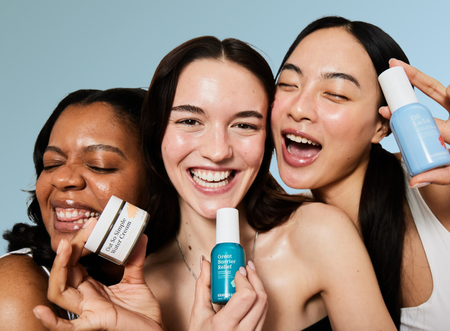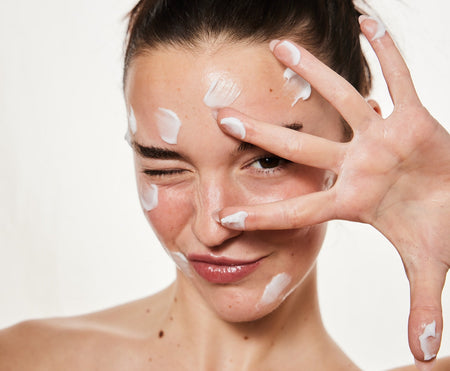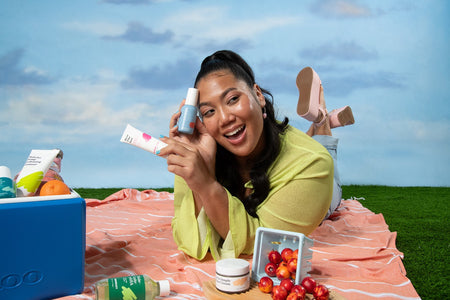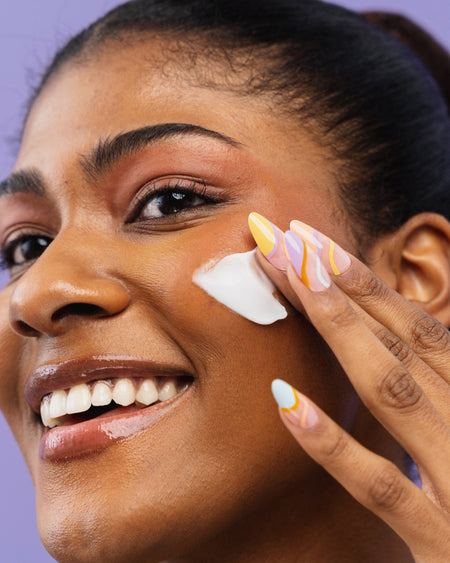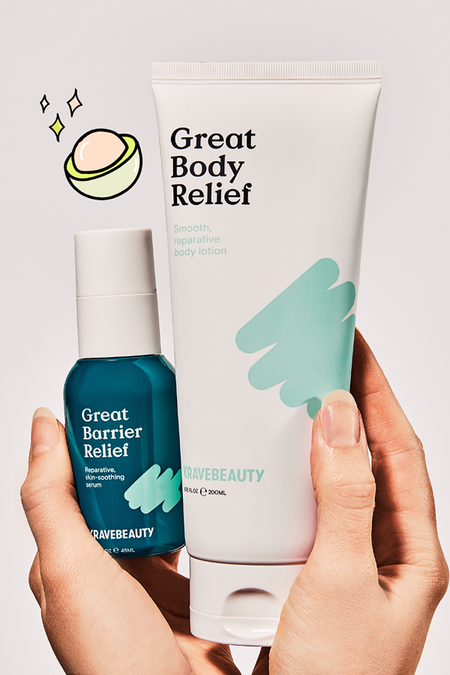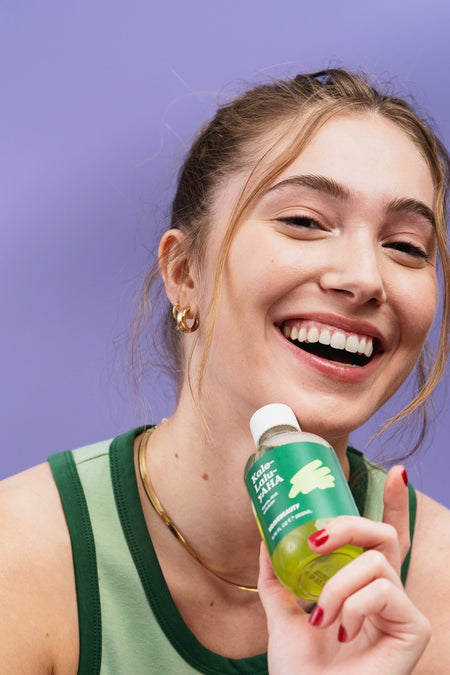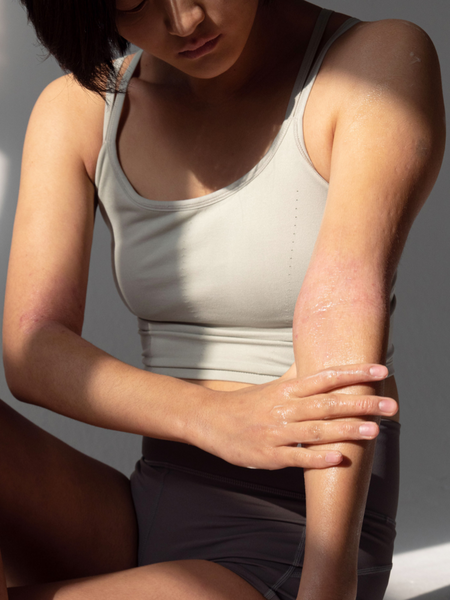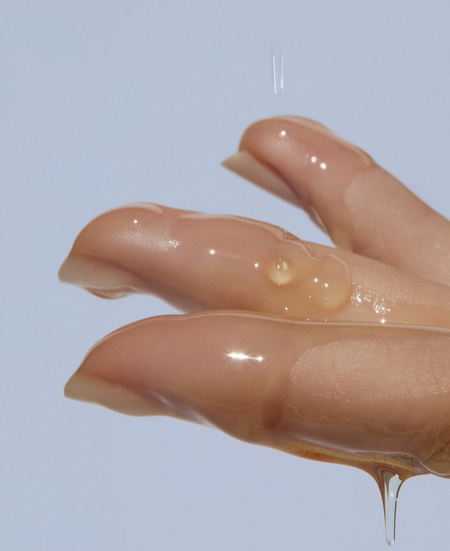Your Uncomplicated Guide to Skincare

Hot take: skincare doesn’t have to be complicated.
Overwhelmed by it all? We don’t blame you! There are so many products, steps, and ingredients out in the world, that it’s easy to get swept up in information overload. But don’t fret, we’re diving into the basics so you can have a solid foundation from which to grow your skincare knowledge.
Let’s take it nice and slow, and break down some of the main parts of a typical skincare routine.
CLEANSER
Why is it important?
In short, cleansing helps get rid of all the grime on your face. Lots of external aggressors can build up on your skin (like makeup, sunscreen, dirt, bacteria, oil) but starting your routine with a good cleanser gets rid of anything you’d probably rather not let sit on your face for too long. Plus, it sets up your skin for the rest of your routine!
How should I use it?
Cleansing either once or twice a day should do the trick! If your skin is on the dry side, washing your face once a day might be best for you. Your once-a-day-cleanse should be done at night so you don’t sleep on any makeup/dirt/sunscreen/ that has accumulated throughout the day. In the morning, just splash your face with some water instead of using a cleanser. If your skin tends to be oily, we recommend seeing how cleansing twice a day—once in the morning and once at night—works for you.
It’s also important to note that when it comes to cleansing, you don’t want to overdo it. We know how satisfying it feels to get the gunk off your face, but cleansing too much can damage your skin barrier. And who wants that?
Check out Matcha Hemp Hydrating Cleanser for a pH-balanced, non-stripping cleanse you’ll definitely look forward to.
SUNSCREEN
Why is it important?
When it comes to skincare, SPF is your BFF. No, really. Sunscreen is hands down THE most important step in your routine. A lot of skincare can vary from person to person, but wearing SPF is the most universal advice you’ll get. It helps prevent wrinkles, fine lines, and signs of premature aging and most importantly protects against skin cancer.
How should I use it?
We’ve said it before and we’ll say it again: apply sunscreen every single day. UVA/UVB rays still pass through the clouds and UVA rays can penetrate through glass so apply whether you're indoors or outdoors and whether it’s cloudy or sunny.
Go for a sunscreen with at least SPF 30 (although SPF 50 is where it’s at) and remember that having a separate sunscreen product is generally better than a moisturizer or foundation with SPF in it.
Always make sure to apply liberally! It’s recommended to use a teaspoon each time you apply, which is about 2-3 fingers worth if you don’t want to pull out the measuring cups. And don’t forget to reapply every two hours to get the max protection!
Looking for an SPF you’ll want to wear every day? Check out Beet The Sun SPF 40 PA+++, a lightweight, broad-spectrum sunscreen you’ll love applying and reapplying.
MOISTURIZER
Why is it important?
Moisturizer helps keep your skin balanced, maintain a healthy skin barrier, and protect from irritation and dryness.
How should I use it?
Twice a day, after cleansing (or a splash of water in the A.M.) is typically the sweet spot!
Now speaking to all you oily skin folks: You still need to moisturize! We know it may seem counterintuitive, but a good lightweight moisturizer (*cough cough* Oat So Simple Water Cream) can actually help your oil glands chill out and rebalance.
CHEMICAL EXFOLIANTS
What are they and why are they important?
Seeing the word ‘acid’ on a skincare ingredient can definitely be daunting at first glance, but chemical exfoliants are actually great allies to our skin when used properly. They work with your skin’s natural functions, like cell turnover and oil production, and are gentler than physical scrubs and exfoliants.
Chemical exfoliants are broken down into two main types, and they’re both important for different skin concerns. AHAs (Alpha Hydroxy Acid) help reduce signs of sun damage, even out skin tone, and bring out your inner glow (what we all strive for, right?). Then there’s BHAs (Beta Hydroxy Acid), which have anti-inflammatory properties, can help treat acne and reduce the appearance of large pores.
Some common AHAs are Glycolic Acid (like our Kale-Lalu-yAHA), which is the strongest AHA. Lactic Acid is great for those with drier skin, and Mandelic Acid is a good option for people with darker skin because it’s more gentle.
The most common BHA is Salicylic Acid, which you’re probably seen in products targeted to treat acne.
How should I use it?
When starting a new exfoliant, always go slowly and use lower percentages so your skin can adjust. Start by using your exfoliant 1-2 days a week and see how your skin does. Over time, you can use it more frequently, though we believe that most exfoliants don’t need to be used every day.
Over-exfoliating tends to happen easily, so always lean towards the side of caution and make sure not to overdo it. We recommend using exfoliants at night since they make your skin more photosensitive (AKA more reactive to the sun’s rays).
Exfoliants should be used after cleansing, but when you're first starting off, you can mix it in with your moisturizer to make it more gentle on your skin.
SERUMS
What are they and why are they important?
Serums are totally awesome, but they’re a part of what we call “supplemental skincare,” meaning they’re not necessarily needed for everyone. Serums have a wide range of purposes, and each serum can add quite a unique addition to your routine, so the key is to find ones that fit your skin’s needs. Some people might use several serums they switch between, some people might use none. Your routine should be tailored to you, and only you.
How should I use it?
Serums will typically go in the middle of your routine. They should be applied after cleansing (and after exfoliating, if that’s a part of your routine) and before moisturizer.
Most serums are ingredient-focused products, so finding formulas that work with you is really important. Since serums have a wide range of purposes, how often you use them will vary by each individual product. A serum with AHA, for example, might be best used only a few times a week, whereas a soothing serum (like Great Barrier Relief) could be used more frequently. Of course, it’s important to find what works best for your skin, but starting slow and building up from there is a good rule of thumb.
MASKS
What are they and why are they important?
Masks, like serums, have a lot of different purposes. Some masks are for hydration, while others can target acne, and some even exfoliate. Masks come in all different shapes and sizes—there are sheet masks, wash off masks (like clay masks), and even sleeping masks. They’re not always necessary for your routine, but can be a fun way to indulge in some much-needed self-care.
How often should I use it?
This depends on the individual mask you want to use, but generally, once a week is good. Just like with exfoliating, it’s possible to over-mask. Be careful not to overdo it!
Tl;dr: When first dabbling into skincare, start with the core of your routine—cleanser, moisturizer, SPF—then slowly work your way up from there. Serums, exfoliants, and masks are a great supplement to your routine but should be used on an as-needed basis. There’s no one-size-fits-all when it comes to skincare. A product your friend recommended might not work for you, and vice versa. Tuning into what YOUR skin is craving is the best way to find a practice that works for you. After all, you are the only expert of your skin.
And that’s on listening to your skin✌️





